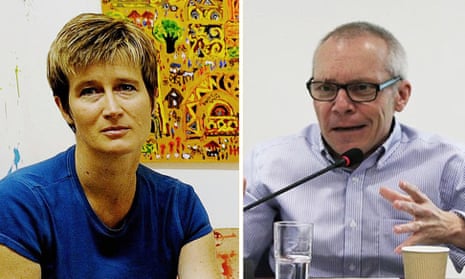Almost 6,000 people will be released from prison in Myanmar, including the Australian academic Prof Sean Turnell, Britain’s former ambassador Vicky Bowman and the Japanese film-maker Toru Kubota, junta-controlled media has said.
On Thursday, Myanmar’s state-run MRTV said that the foreign nationals, as well as a Burmese-American citizen, had been released and deported in a so-called amnesty timed to coincide with Myanmar National Day.
In total, 5,774 prisoners would be released, state media said, including 712 people it described as political prisoners.
Bowman is currently on a flight from Yangon to Bangkok, a diplomatic source said. The Guardian was unable to confirm whether other foreign nationals had yet been freed.
On Thursday morning, families gathered outside Yangon’s notorious Insein prison hoping to see their loved ones. Dr Myo Nyunt, spokesperson for Aung San Suu Kyi’s National League for Democracy party, the author Maung Thar Cho, and the activist Mya Aye, a leader of the 1988 pro-democracy uprising, were among those released on Thursday afternoon, according to local media.
After his release, Mya Aye defiantly told the crowd: “I will always stand together with the people of Myanmar.”
The military seized back power in a coup on 1 February 2021, and has arrested thousands of people, targeting anyone it suspects of opposing its rule, from elected politicians, to nurses and teachers, social media stars and journalists.
Several foreign nationals have also been targeted, including Bowman, who was the British ambassador in Myanmar from 2002 to 2006.
Bowman and her husband, Htein Lin, a prominent democracy activist, were sentenced in September to one year in prison for violating immigration laws. Htein Lin would also be released on Thursday, according to state media.
Bowman, who began her diplomatic career working as the second secretary at the British embassy in 1990, had remained in the country after the coup, and leads the Myanmar Centre for Responsible Business.
Kubota, who was arrested during a demonstration in Yangon in July, had been charged with sedition and violating a communications law. He had been sentenced to 10 years after being convicted of sedition, as well as breaching the immigration rules and an electronic communication law.
Dozens of journalists have been detained since the coup, while independent media outlets have been raided and had their licenses revoked, forcing reporters to work underground – at great personal risk – or work in exile.
A spokesperson for Japan’s government, Hirokazu Matsuno, told reporters that Kubota was in good health and was due to leave Myanmar on a Thursday night flight. He could be in Japan as soon as Friday, Matsuno said.
According to local media, five Myanmar journalists were among those released on Thursday.
Sean Turnell had served for several years as an adviser to the democratically elected civilian government led by the ousted leader Aung San Suu Kyi.
An economist at Sydney’s Macquarie University, Turnell was first detained on 6 February last year, less than a week after a military coup removed Myanmar’s elected government.
Turnell was later charged with violating Myanmar’s Official Secrets Act, with the military accusing him of possessing confidential documents. Turnell denied the charge, saying the documents were not confidential, but economic recommendations he had provided to the government. He pleaded not guilty but was convicted in a closed trial and sentenced in September to three years in prison.
The Australian government “completely rejected” the charges against him. On Thursday, Australia’s foreign minister, Penny Wong, said “we welcome reports in relation to Prof Sean Turnell”.
Tim Harcourt, a family friend and colleague, told ABC Radio National that he understood Turnell would leave Myanmar and travel to Thailand – where he could end up meeting the Australian prime minister, Anthony Albanese, who was travelling to the same country for the APEC summit.
Harcourt said Turnell’s family were “greatly relieved” but “a bit nervous”. “Once he touches down on Australian soil, we can be really relieved,” he said.
“I understand he’s flying to Bangkok. I think there’s a possibility he might meet the prime minister Anthony Albanese, who happens to be in Bangkok at the moment, maybe. And then back to Sydney.”
Albanese was travelling to Thailand from Indonesia, where he has been for the G20 summit. Albanese’s office had been contacted for comment.
Albanese raised Turnell’s case with the leaders of Cambodia and Vietnam at the Asean summit over the weekend. Asean countries mounted several pushes to isolate Myanmar’s ruling junta at the meeting.
Harcourt praised Albanese and Wong for their work in advocating for Turnell. “We’ve had support from a number of Asean countries which has been terrific,” he said.
The Assistance Association for Political Prisoners said on Wednesday that the number of political prisoners who remained in detention in Myanmar had reached more than 13,000 – a record high. Among them were 1,648 serving sentences.
Wai Hnin Pwint Thon, a senior advocacy officer at Burma Campaign UK, said on Wednesday night that the international community was failing to press Myanmar over the huge numbers of people being held. Under the previous military dictatorship pre-2010 the average was just over 2,000, the group said.
“Despite the record number of political prisoners, they barely get mentioned by governments and world leaders,” said Wai Hnin. “The fact that so many people have been jailed demonstrates the level of fear the Burmese military have of the people of Burma. The Burmese military are afraid for their survival and arrest anyone they see as a threat.”
Additional reporting by Ben Doherty










